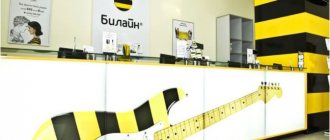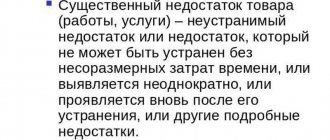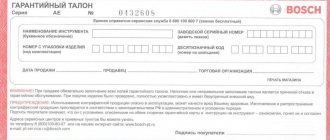Who decides which items cannot be exchanged or returned?
The list of products that cannot be exchanged or handed over is determined by Government Decree No. 55. The first edition was approved on January 19, 1998. Since the publication of the “Rules of Sale,” changes have already been made 5 times, supplementing the list of products with new names and categories.
The list is closed, that is, neither the consumer nor the retailer can add or exclude any item from the list. The category of goods that cannot be returned or exchanged includes only non-food products. Items not included in this list can be replaced with similar ones within 14 days. If the seller was unable to offer an alternative, the buyer has the right to issue a refusal and take back the money spent. The period for such situations is counted from the next day after the execution of the purchase and sale agreement.
The procedure and possibility of returning food products is regulated by Art. 18 and 25 of the “Law on the Protection of Consumer Rights”.
Claim for return of auto parts
There are often cases when a store refuses to accept goods, while violating the law. In this case, you need to write a claim for the return of the auto part. The document is drawn up in two copies addressed to the store manager. One copy is presented against signature or by post.
The application must indicate:
- Sender details;
- Recipient information;
- Information about the time of purchase of the product, reasons for the return. Here it is better to state that it does not suit, for example, in color or size. And if the product is defective, all defects are described;
- Submitted requirements with mandatory reference to the regulatory framework;
- Deadline for fulfilling the claim;
- List of attached documents. Only copies are attached. The originals remain with you;
- Date of compilation and signature
The legislator has not established a specific deadline for fulfilling the claim. But it should be understood that a reasonable period must be indicated in the application. That is, if a replacement of a defective product is required, then first of all an examination must be carried out. And the time frame for this is not short. Accordingly, it would not be correct to indicate ten days for compliance with the requirements.
USEFUL : order a claim for the return of a spare part from our lawyer
Which food products are prohibited from being returned?
You cannot refuse to purchase products and get your money back if:
- the product's expiration date has not expired;
- the packaging is not damaged;
- appearance and quality meets the standards.
The rule applies to all products of the food group, including products:
- plant origin (cereals, pasta, baked goods, vegetables, fruits, nuts, berries, mushrooms, sugar);
- animal origin (eggs, dairy products, fresh and frozen poultry, animals, fish);
- mixed types (juices, carbonated drinks, tea, fats, margarine, seasonings, alcohol, etc.).
You can hand over products and receive payment only if they have lost their appearance, violated storage conditions, or expired. For example, fresh sausage cannot be handed in, but opened canned fish with “taste” can be returned, even if the packaging was intact and the storage period has not expired.
Which products cannot be returned or exchanged?
The store administration has the right to refuse the consumer if he tries to hand over personal hygiene items, cosmetics or perfumes: toothbrushes, oral care products and pastes, combs, hair clips, hair combs.
This category also includes makeup brushes, nail polish, decorative cosmetics, hair and body care products, diapers for children and adults, creams, disposable and reusable machines, etc. This also includes household chemicals: from washing powders to window cleaners and grease removers. The exception is if the packaging was found to be damaged.
Textile products sold by the meter: any fabric, trim, braid, tape, etc. Cable products, linoleum, carpeting, insulation, greenhouse materials cannot be returned or exchanged.
The “non-returnable” item includes sets of upholstered and kitchen furniture if they are sold as a set.
The bookstore will not accept books, maps, atlases, booklets, brochures, reproductions of paintings or posters.
Exchanges and returns of any jewelry are prohibited: gold, silver, platinum, inlaid with precious stones or without them.
The administration of a pet store or flower salon will have rights in refusing to accept back animals, potted plants or bouquets.
Stockings, socks, underwear, knitwear, towels, and bedding sets cannot be returned to a clothing or bedding store.
But the buyer cannot refuse an exchange or refusal of a blanket, bedspread, or sofa cushions. These products are bedding products, not bed linens. You can also exchange outerwear, blouses, skirts, school uniforms, and men's suits.
The seller will be right if he refuses, even if he tries to replace plastic containers for storing and freezing products that come into contact with food. The ban does not apply to porcelain, ceramic, glass and metal dishes.
If the dealership refuses to pick up the car, there is no violation of the law. A trading company may refuse to return vehicles, ships, boats, or trailers.
The situation is similar with civilian firearms, which must be sold upon presentation of a permit to carry and own.
The list also includes medications and medicines.
Returning car parts to a store
Today we will look at the question of whether auto parts can be returned.
This question arises very often among car owners. Why? Well, look here. Let's take myself as an example. Here I am the owner of a Mitsubishi car. Reliable car, by the way.
When driving over bumps, speed bumps, etc. An unpleasant grinding sound, similar to a crunch, was heard from the front of the car.
I went to the chassis diagnostics, where the problem was found - the front stabilizer bushing.
Based on the diagnostic results, I was eventually asked to change the rear stabilizer bushings, the front control arm silent blocks, as well as the front stabilizer struts and bushings.
I went to a store that sells auto parts for foreign cars and purchased all the above parts because they were in stock.
Now, let's imagine the situation. Let’s say, after purchasing spare parts, I decided that the “back” of the car is already in order and I won’t change anything in the chassis for now, but will only update the “front” in order to eliminate the annoying crunching and grinding noise when driving over bumps and irregularities.
Thus, I didn’t need the rear stabilizer bushings at the moment, but I spent my money on them and, since I didn’t need the rear stabilizer bushings, I naturally wanted to return the auto parts to the store “as unnecessary” and get it back from the seller is my money.
So, what do you think - are auto parts returnable?
To answer this question, you should carefully read the contents of Art. 502 of the Civil Code of the Russian Federation
1. The buyer has the right, within fourteen days from the moment the non-food product is transferred to him, unless a longer period is announced by the seller, to “exchange the purchased product” at the place of purchase and other places announced by the seller for a similar product of a different size, shape, size, style, colors or configuration, making the necessary recalculation with the seller in case of a difference in price.
If the seller does not have the goods required for exchange, the buyer has the right to return the purchased goods to the seller and receive the amount of money paid for it.
The buyer's request for an exchange or return of goods must be satisfied if the product has not been used, its consumer properties are preserved and there is evidence of its purchase from this seller.
2. The list of goods that are not subject to exchange or return on the grounds specified in this article is determined in the manner established by law or other legal acts.
To begin with, we open the Decree of the Government of the Russian Federation dated January 19, 1998 No. 55 “On approval of the Rules for the sale of certain types of goods, a list of durable goods that are not subject to the buyer’s requirement to provide them free of charge for the period of repair or replacement of a similar product, and a list of non-food products of adequate quality , which cannot be returned or exchanged for a similar product of a different size, shape, size, style, color or configuration.”
In this resolution we look through the List, the name of which I have highlighted in red, to see whether auto parts are included in the specified List.
Just, damn it, friends - really read this regulatory document itself, and not stupid excerpts from it on all sorts of sites.
Learn to read regulations from the source. This will give you a later understanding of which sites bring you blizzards, and which ones give you mana from heaven.
In fact, let's take the first three sites I came across
Site No. 1
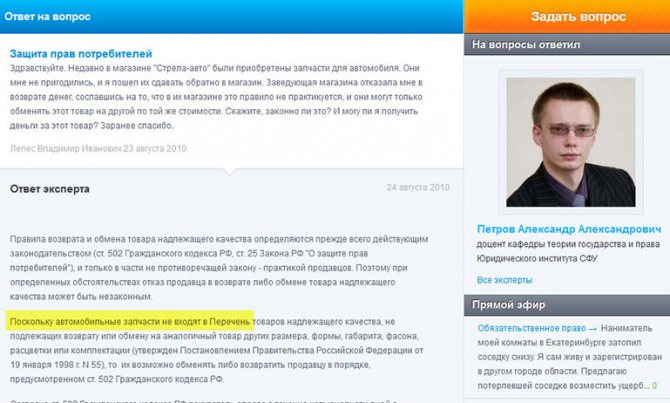
Site No. 2
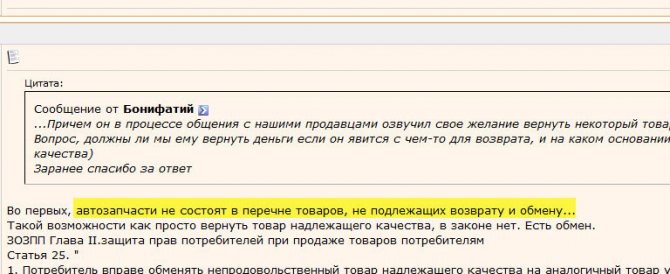
Site No. 3

Did you notice what I highlighted in these screenshots with a yellow fill? Everywhere it is written that auto parts are not included in the List of goods that cannot be returned or exchanged. Do you believe this?
Well, of course - after all, on the first screenshot website, even an associate professor at some law institute himself wrote this!
How can you not believe him, Evgeny?
Well, let me show you that what is written on many sites and highlighted in yellow in the screenshots above is not entirely true. Look what is shown in the picture below
What is this?
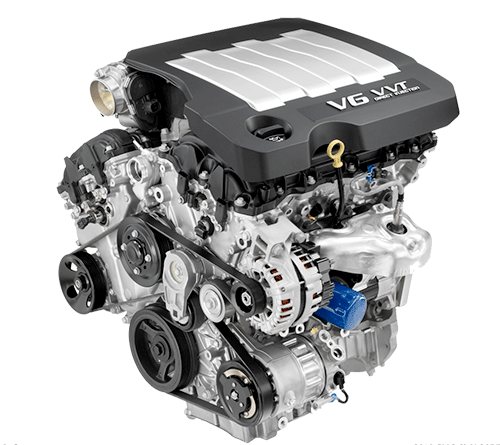
That's right, this is a car engine. The complete car engine can be purchased at a car dealership or made to order. So, let's go back to the List. Look at point 10
10. Cars and motorbikes, trailers and numbered units for them;
Is the engine a numbered unit? Epic!!



